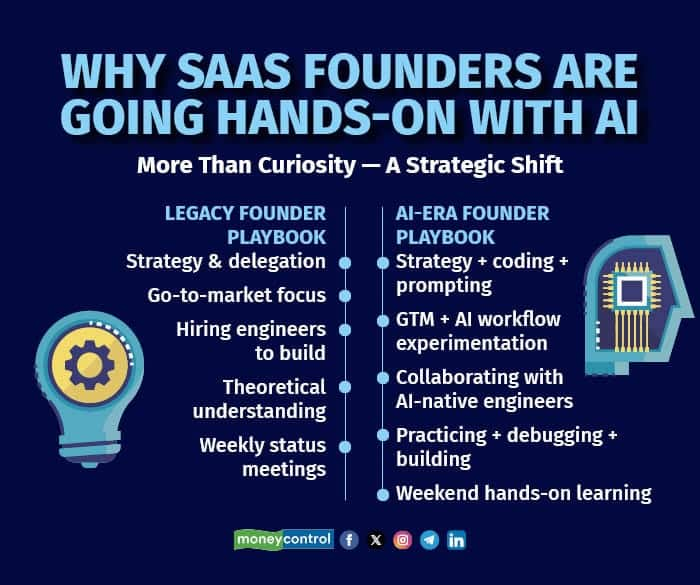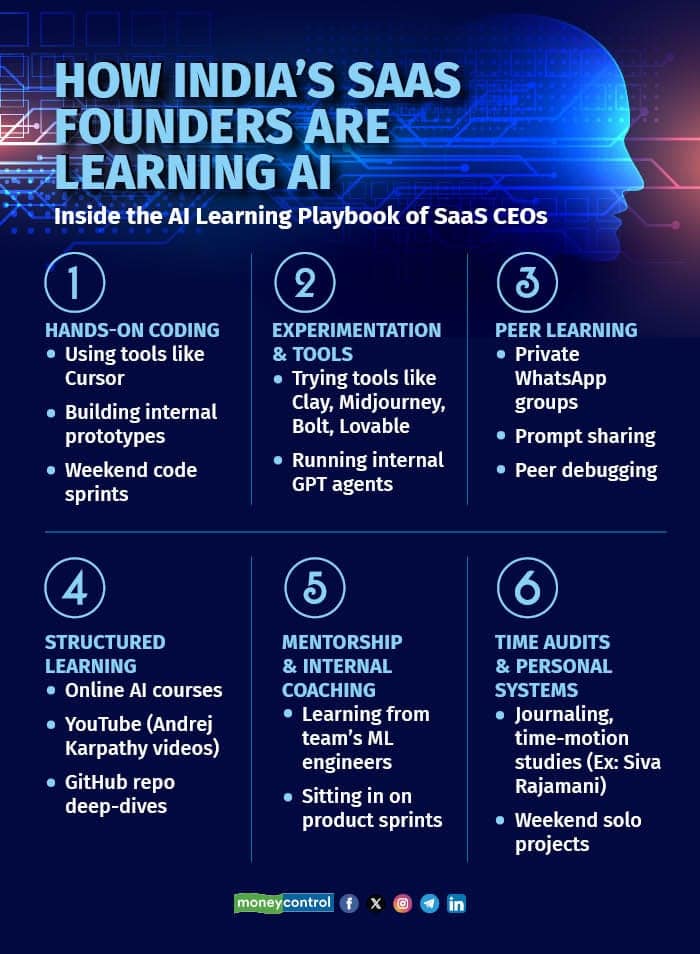



On a quiet Sunday morning, Krish Subramanian isn’t at a golf course or sitting down for brunch. Instead, the Co-Founder of the subscriptions management platform Chargebee is at his desk, writing — code.
Subramanian, who once focussed most of his time on strategy, now spends weekends experimenting with AI tools like Cursor, a code editor designed for AI-native workflows. “It’s the only way to truly understand what’s changing under the hood,” he says.
He is not the only one trading off-hours leisure for hands-on learning. Across India’s SaaS ecosystem, startup founders are embracing late-night coding sessions, reading research papers, and experimenting with AI — not just to lead their companies but to stay relevant in a rapidly evolving software landscape.

The Co-Founder of the agentic subscription platform Atomicwork, Vijay Rayapati, splits his time between investor meetings, product reviews, and family duties — but still carves out time to code. It’s a habit he’s revived deliberately, to keep pace with AI-native product development.
"I try to code whenever I get some free time, even if it's just an hour here or there. It’s important these days to understand what’s happening and keep up with how fast things are changing," he says.
At enterprise SaaS firm Kovai.co, Founder and CEO (added) Saravana Kumar made an even bigger commitment. He took three-months of time dedicated to going deep into artificial intelligence. During this time, Kumar focussed on technical reading, testing models, and building internal AI prototypes.
"More than practice, I code myself. I learn quite a bit. A founder today must lean more toward the GTM (go-to-market) side. Engineering is something you can fix internally, but GTM needs to be fixed from the outside. GTM is where tech founders end up, and I learn a lot about using AI on the GTM. I use Clay, I went very deep into it,” Saravana said.
At professional services automation (PSA) and remote monitoring and management (RMM) platform SuperOps, Co-Founder Arvind Parthiban takes a different route. He’s part of a private WhatsApp group for founders, where they share prompts, code snippets, use cases, and failures.
"While I don’t code myself, I’m always experimenting with the latest marketing tools to understand their potential. I also make it a point to stay connected with other founders, engineers, and experts in the industry — those conversations help me keep up with what’s new and how AI is evolving in real time," said Parthiban.
At the digital adoption firm Whatfix, Co-Founder Khadim Batti sees FOMO pushing even non-engineering leaders towards experimentation.
"More leaders are now coding, they want to get hands-on experience. Our firm’s Success Leader is also coding now, we all have FOMO about what's new in AI and coding. When I met my R&D head, I said that I'm most jealous of the team as it is the best time to be part of R&D in AI."

With AI evolving at breakneck speed, many tech founders are finding creative ways to stay current.
Some, like Parthiban, rely on peer groups — closed WhatsApp or Slack channels where founders regularly share model performance updates, prompt tuning methods, or infrastructure hacks. These informal spaces have become support systems, offering both encouragement and early access to ideas in development.
Others are learning directly from experts. Some founders schedule regular calls with AI researchers or senior ML engineers from their own teams, treating them as mentors. A few even sit in on internal workshops or product sprints purely to absorb.
There are also those who prefer structured learning. A few CEOs have enrolled in short AI courses, read technical blogs on platforms like Hugging Face or LangChain, or follow GitHub repositories and open-source projects to reverse-engineer working models.
For Vignesh Girishankar, Co-Founder of the customer onboarding software firm Rocketlane, AI has disrupted long-held assumptions about product timelines and workflows.
"For every feature that is demoed, we ask how much is written by AI. It has changed the game completely. Every product manager has to be an AI product manager today. I have been building products for so long, we have a mental model of how quickly we can do things — now it feels like you have to learn everything anew. I don't think theoretical knowledge works. You have to make workflows happen with your own tooling. My other Co-Founder codes for internal use cases as well. I test a lot of tools," he says.
Siva Rajamani, Co-Founder and CEO of Everstage, a sales commission and analytics firm, even did a time-motion study on himself.
"I did a time-motion study of myself — how I spend my time, where all my time is actually going. I saw what's the recurring non-productive time. Honestly, everyone is still figuring out how to experiment, how to learn. But there is no barrier to learning. People who are more curious can learn," he explained.
Even those not yet hands-on with code are investing deeply in understanding the underlying tech.
I use ChatGPT. There are a few videos on YouTube, including one by the computer scientist Andrej Karpathy. I have also signed up for a few courses. This is mostly to get a sense of the insides of an LLM… Two years ago, I went to the Valley and caught up with many of my old friends, who are all engineers. I took them to coffee and picked their brains about AI. People also share some useful podcasts. But unlike some of the other founders, I haven’t started coding — maybe I should," said Shivakumar Ganesan, Co-Founder of Exotel, a customer engagement platform.
"I also want to hire a couple of engineers who will work on something apart from what Exotel is doing. And I want to learn from them," Ganesan added.
A smaller set of business managers has taken to journaling or building small weekend projects — anything from internal chatbots to custom GPT wrappers — as a way to convert theory into applied knowledge. These solo experiments, however small, give them insight into how modern AI products are built, iterated, and deployed.
Not just curiosity — a strategic shiftWhat may look like tech nostalgia is actually a strategic pivot. These founders aren’t learning AI to become engineers again — they’re trying to lead from the front in a domain where legacy playbooks no longer work.
Suresh Sambandam, Founder of Kissflow a no-code, low-code SaaS firm, finds himself trying out a host of emerging tools.
"Anytime a new thing comes, we are all going to try it. I tried Cursor, I tried Lovable, there is also Bolt — these are all close to my area. There is also Midjourney. It helps me rethink the team structure. And it eventually helps managers hire better,” he said.
“After using such tools, I understand we need more technical talent for AI than conventional talent, more technical product managers. That’s how we are restructuring the organisation,” he added.
Generative AI has redefined software development cycles, design thinking, and GTM timelines. To build for the new era, CEOs say they must understand the foundational shifts — from prompt engineering and agent-based systems to latency issues in LLM inference.
This means getting into the weeds. Understanding how vector databases power retrieval-augmented generation (RAG) workflows, or why model hallucination poses risks for enterprise tools, is no longer the purview of just technical architects — it’s becoming part of a founder’s job description.
Investors back builders, not bystandersInvestors are taking note of this trend. In pitch meetings and board reviews, technical depth and AI experimentation are fast becoming markers of leadership.
"I have used all the new tools for coding. I have started learning. I learn by talking to people. Being an investor as well, I get the chance to meet several SaaS founders and I get to learn from them. In fact, our portfolio companies like Composio and Emergent are doing very well," says Girish Mathrubootham, Founder of Freshworks and Co-Founder of Together Fund, a SaaS and AI fund.
"The barrier was too high before AI came into coding. With AI, anyone can experiment. Earlier, companies used to spend a lot of hours developing an environment so an engineer could code within a day — today that threshold has been lowered. Many CEOs want to experiment themselves. A founder needs to know what works and what doesn’t, ," says Prasanna Krishnamoorthy, Co-Founder and Managing Partner at SaaS acce;erator fund, Upekkha
Some venture capital firms now run AI bootcamps for their portfolio founders, while others expect technical demonstrations during fundraising — not just show slides.
In a competitive funding environment, especially with valuations under pressure, founder-led AI credibility is a differentiator.
Sharper skills, smarter hiringFounders say this hands-on learning isn’t just about keeping up — it’s also helping them hire better. By understanding the nuances of AI tooling and architecture, they’re able to ask sharper questions in interviews, evaluate talent more effectively, and set clearer expectations for technical roles.
It also improves internal alignment. Engineers are more motivated when they see the leadership speak their language — whether it’s about latency optimisation, fine-tuning models, or evaluating hallucination risks. The result, founders say, is faster execution, fewer misunderstandings, and better product decisions.
Ultimately, this technical fluency boosts efficiency — not just in development, but across product, design, and customer success teams that increasingly rely on AI workflows.
“Some founders push their teams to try AI but they don’t do so themselves. I took three months to learn this — how it works and how we can leverage it for our business. I created a playbook to tell people how to use these modern tools and educated my team. Now they are taking over and doing it themselves,” explained Saravana.
India-focused companies do not have enough experience or hands-on expertise in AI, everything is happening in the US. However, founders really can help out, Saravana added.
Playing the long gameIn the age of AI, leadership has taken on a new dimension. It’s no longer just about having a five-year plan or a sharp go-to-market strategy. It’s about understanding GPU constraints, playing with new APIs, and staying curious about what’s next.
The new-age tech founder is equal parts CEO, product manager, and developer — someone who can manage roadmaps and also roll up their sleeves to debug an inference error at midnight.
For now, that means weekends look different. They’re not for rest — they’re for reinforcement learning.

Discover the latest Business News, Sensex, and Nifty updates. Obtain Personal Finance insights, tax queries, and expert opinions on Moneycontrol or download the Moneycontrol App to stay updated!
Find the best of Al News in one place, specially curated for you every weekend.
Stay on top of the latest tech trends and biggest startup news.